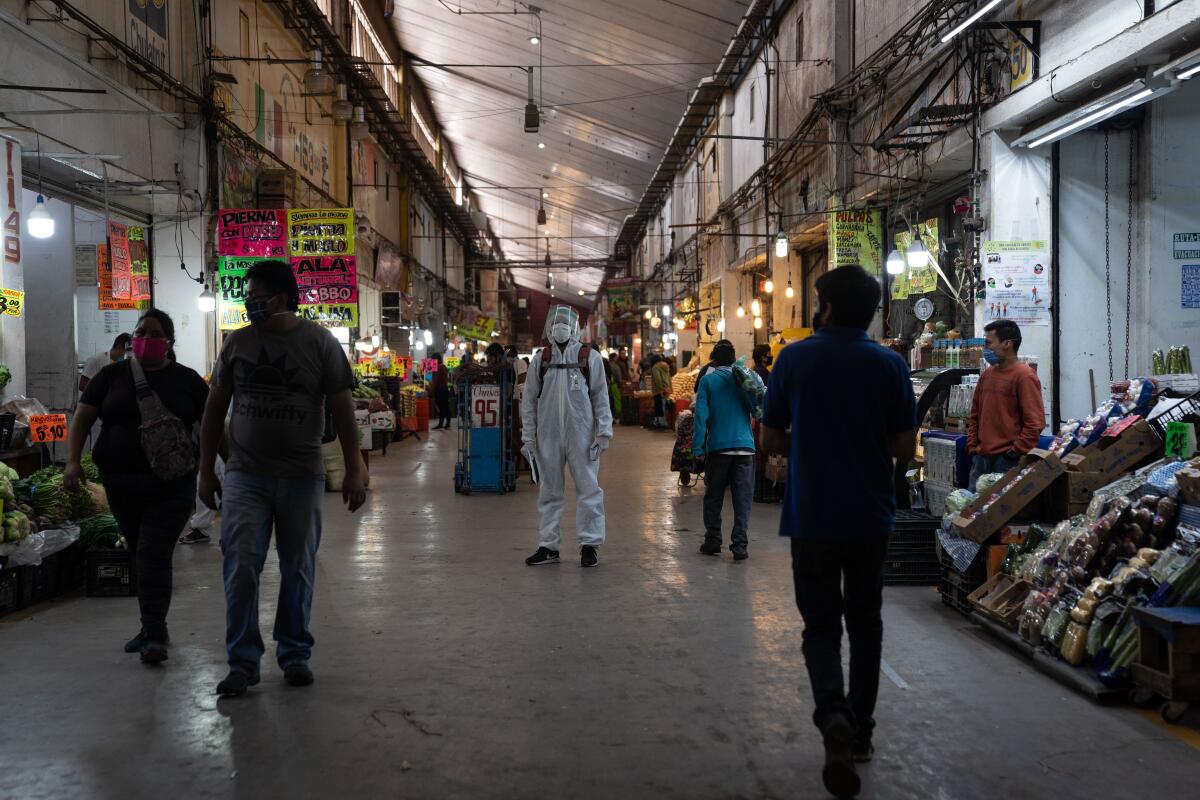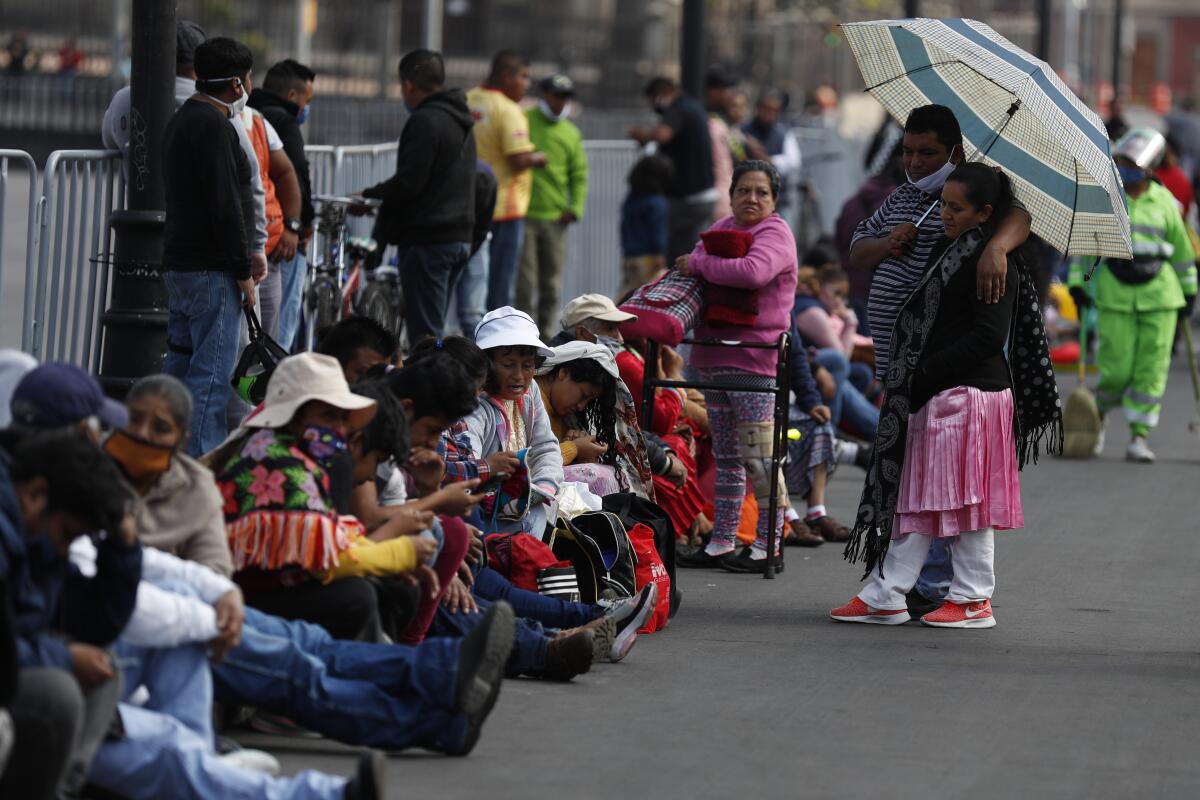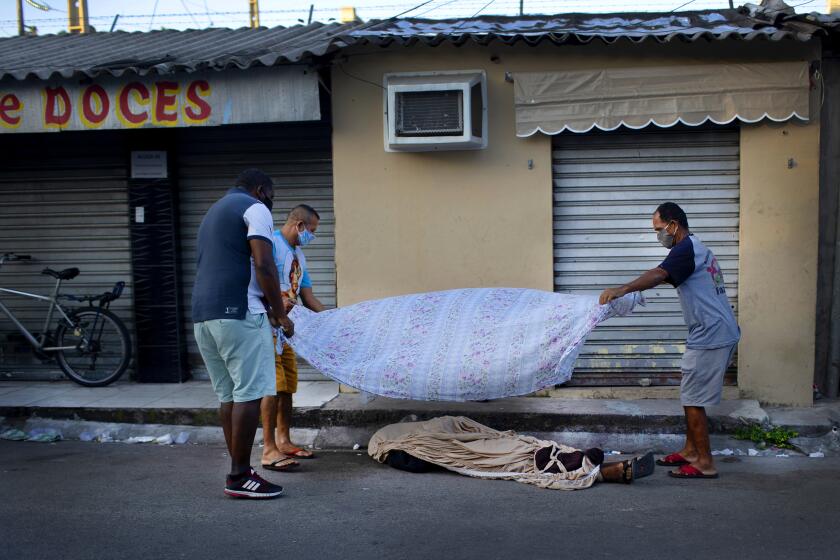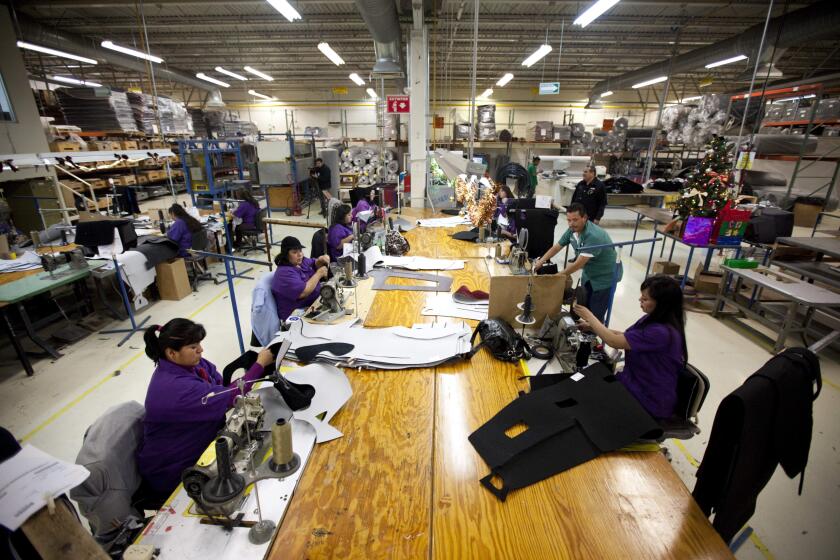The whole world is spending to fight coronavirus. In Mexico, the leftist president is making cuts

MEXICO CITY — Mexican President Andrés Manuel López Obrador is one of the world’s most powerful leftists — a longtime champion of the poor who delivers scathing indictments of neoliberalism and the global elite.
Yet his approach to government spending — even in the face of the COVID-19 pandemic and its economic fallout — might best be compared to that of conservative icons Ronald Reagan and Margaret Thatcher.
For the record:
10:40 a.m. May 22, 2020An earlier version of this story misidentified Juan Carlos Moreno-Brid as José Carlos Moreno-Brid.
López Obrador has eliminated entire government departments, slashed the salaries of officials and cancelled year-end bonuses. Those cost-cutting measures come on top of steep cuts enacted early on in his administration that targeted everything from the country’s Olympic training program to public hospitals.
At the same time, López Obrador has rejected bailouts, tax breaks and debt relief, making Mexico the only large country in the Western Hemisphere that has not announced an economic stimulus package to counter the economic fallout from the pandemic.
“We have to seek austerity and consume only what we need,” he said at a news conference Wednesday in which he urged Mexicans to save their money. “If we already have shoes, why buy more?”

Economists across the ideological spectrum warn that austerity amid the crisis is pushing the nation toward disaster.
The economy is expected to shrink by at least 7% this year — hammered by a lethal combination of plunging oil prices, less demand for manufactured goods, fewer remittances and the collapse of the tourism industry.
In March and April alone, Mexico lost more than 700,000 jobs in the formal economy. The Inter-American Development Bank predicts that by year’s end another 2 million people may be out of work.
The National Council for the Evaluation of Social Development Policy predicts the crisis could push as many as 10.7 million people — about 8.5% of the population — into extreme poverty, defined as having a monthly income of less than $67 in cities or $60 in rural areas.
Catholic leaders recently urged the president to redirect money from some of his pet infrastructure projects — including construction of an $8-billion oil refinery — to give cash payments to families, warning that in a country with no unemployment insurance, many were already going hungry.
The United Nations predicts that a global recession will reverse a three-decade trend in rising living standards and thrust half a billion people into extreme poverty.
Some of the president’s own policymakers have pushed for stimulus measures. Gerardo Esquivel, a leftist academic who was nominated by López Obrador to the board of the central bank, has called for new spending programs that would give checks to those without work and tax breaks to small businesses.
Virtually all economists agree that governments should run a budget deficit in times of recession, Finance Minister Arturo Herrera Gutiérrez wrote in a policy document late last year.
López Obrador has held firm.
Though he campaigned on a promise to help lift the poor out of poverty, he also vowed to drastically cut government spending, waste and corruption.
Much of his popular appeal is derived from the austerity he practices in his own life. He has shunned the presidential palace in favor of a modest apartment in the building where he works and flies only on commercial airlines — and always in coach.
López Obrador also appears to be guided by haunting memories of past economic disasters, including the government bailout of banks after the 1994 currency crash, in which taxpayers were stuck covering bad loans given to friends and family members of bank executives.
“His entire political career he has spoken out against this,” said Genaro Lozano, a political scientist at the Iberoamerican University in Mexico City. “One of the reasons he got to the presidency had to do with the fact that people were very angry about the use of public money for frivolities.”
Instead of passing economic stimulus measures, López Obrador is taking what he considers a more direct approach to solving the financial crisis: pushing to reopen the economy.
On Wednesday, nearly two months after he ordered a halt to all nonessential commerce, he said businesses and schools in hundreds of counties where coronavirus infections have not been reported can reopen beginning May 18, with the rest of the economy gradually restarting on June 1.
He also said he had given the green light for three key industries to resume next week — construction, mining and the manufacture of cars and auto parts. “There’s a light at the end of the tunnel,” López Obrador said.
Later in the day, Deputy Health Secretary Hugo López-Gatell said the auto, construction and mining industries in fact would not be allowed to reopen until June 1.
News of factories reopening was welcomed by many U.S. businesses that rely on cross-border trade and have been lobbying to lift restrictions, said Michael Camuñez, president of the consulting firm Monarch Global Strategies and a former assistant secretary of the U.S. Department of Commerce.
The economies of Mexico, Canada and the United States have become ever more integrated, yet each country has issued its own guidelines about which businesses could continue operating and which had to shut down.
“That’s created a lot of heartburn on both sides of the border,” Camuñez said.
But others worry that Mexico is moving too fast, increasing the risk for another wave of contagion.
Many of Mexico’s border factories are flouting orders to suspend operations, worsening the spread of the coronavirus.
The governor of Puebla state, which is home to a large Volkswagen factory and dozens of parts manufacturers that supply it, criticized the decision by federal officials, saying it will erase hard-earned gains after weeks of social distancing.
“They’re going to ruin everything,” said Gov. Miguel Barbosa, who is a member of López Obrador’s Morena party. “And we are talking about this happening in the middle of the most critical moment of the pandemic.”
On Tuesday, Mexico logged 353 new coronavirus deaths — its highest single-day toll — and by Wednesday it had confirmed a total of 4,220 deaths. Authorities say the true number of deaths is almost certainly higher because relatively few COVID-19 tests have been conducted.
As of late April, Mexico had performed just 0.4 tests for every 1,000 residents, according to the Organization for Economic Cooperation and Development. That’s the lowest rate among the organization’s 37 countries and about 1/40th the rate in the United States.
“Considering the underreporting ... returning to normal activities in two or three weeks seems impossible,” political analyst Ezra Shabot wrote on Twitter. Others cited recent outbreaks in factories along the northern border where some work deemed essential has continued.
Juan Carlos Moreno-Brid, an economist at the National Autonomous University of Mexico, said the pressure to lift restrictions is especially high because just 20% of Mexican workers do jobs that can be performed at home.
“We have to reopen the economy at some point,” he said. “But I’m not sure now is the moment.”
Moreno-Brid voted for López Obrador in 2018, moved by his overtures to the poor and his promise to fight corruption. But he said he has lost faith in the president, in part because of his stubborn refusal to increase spending.
“The key lesson of the Great Depression was that governments should not follow austerity during difficult times,” he said. “All austerity does is prolong a recession.
“His discourse is excellent,” Moreno-Brid said of the president. “But his actual course is disastrous.”
Cecilia Sánchez in The Times’ Mexico City bureau contributed to this report.
More to Read
Sign up for Essential California
The most important California stories and recommendations in your inbox every morning.
You may occasionally receive promotional content from the Los Angeles Times.













